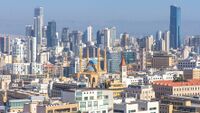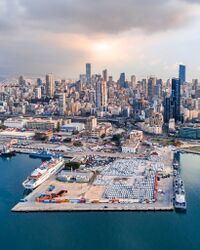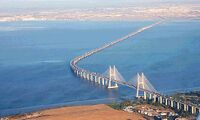Mangata (Freedonia)
Mangata | |
|---|---|
City | |
From Top to bottom: Mangata Central City Skyline, Mangata Center City Skyline from the Port of Mangata, The White City of Mangata from above, The White City of Mangata, Armed Forces Blvd, White Cape Blvd, Monent Building (1933), Mangata Hotel (1937), South Cape Park, Bellevue Beach, San Miguel Bay Bridge (2008) | |
| Nickname(s): The White City, City of the South, Cape City | |
| Country | Freedonia |
| Region | Grand Mangata |
| Founded by | James Mangata |
| Government | |
| • Mayor | Jesscia Wholf (PDP) |
| Area | |
| • City | 130 sq mi (300 km2) |
| • Land | 100 sq mi (300 km2) |
| • Water | 30 sq mi (80 km2) |
| • Urban | 80 sq mi (200 km2) |
| • Rural | 20 sq mi (50 km2) |
| Elevation | 337 ft (103 m) |
| Population (2020) | |
| • City | 1,120,000 |
| • Density | 14,000/sq mi (5,000/km2) |
| Population Density based on Municipal Urban Land Area | |
| Demonym | Mangatan |
| Time zone | Freedonia Time |
Mangata is the largest city of Freedonia and capital of Grand Mangata. The city is the famous for its architecture. Spanning from Art Deco to Modern to Brutalist. The city originally founded in 1736 by James Mangata was destroyed during the Freedonian Civil War. After its aftermath, the city was rebuilt between 1910 and 1945. Mangata saw a second building boom starting from 2005 to the present. Two major parks flank the city, South Cape Park and Mangta Urban Green Belt. The Grand Mangata Region is the metropolitan surrounding the city of Mangata. There are multiple modes of transportation in and around the city. The city is Freedonia's most diverse city, and the economic engine of the country. The most popular form of Freedonian music is Bossa Nova. Which is commonly played in the city at jazz bars/clubs and cafes.
History
Geography
WIP
Climate
WIP
| Climate data for Mangata, Grand Mangata, Freedonia, 1991–2020 normals, extremes 1944–present | |||||||||||||
|---|---|---|---|---|---|---|---|---|---|---|---|---|---|
| Month | Jan | Feb | Mar | Apr | May | Jun | Jul | Aug | Sep | Oct | Nov | Dec | Year |
| Record high °F (°C) | 101 (38) |
100 (38) |
99 (37) |
95 (35) |
91 (33) |
88 (31) |
82 (28) |
83 (28) |
86 (30) |
90 (32) |
95 (35) |
98 (37) |
101 (38) |
| Average high °F (°C) | 79 (26) |
78 (26) |
75 (24) |
70 (21) |
66 (19) |
63 (17) |
61 (16) |
62 (17) |
65 (18) |
69 (21) |
74 (23) |
77 (25) |
70 (21) |
| Average low °F (°C) | 65 (18) |
64 (18) |
61 (16) |
56 (13) |
53 (12) |
48 (9) |
45 (7) |
45 (7) |
49 (9) |
53 (12) |
59 (15) |
62 (17) |
55 (13) |
| Record low °F (°C) | 52 (11) |
50 (10) |
46 (8) |
42 (6) |
37 (3) |
32 (0) |
27 (−3) |
29 (−2) |
34 (1) |
39 (4) |
45 (7) |
49 (9) |
27 (−3) |
| Average precipitation inches (mm) | 5.51 (140) |
4.54 (115) |
3.58 (91) |
2.78 (71) |
3.34 (85) |
4.28 (109) |
5.65 (144) |
4.31 (109) |
3.43 (87) |
2.48 (63) |
3.19 (81) |
4.69 (119) |
47.78 (1,214) |
| Average precipitation days (≥ 0.01 in) | 11 | 10 | 9 | 7 | 7 | 9 | 12 | 11 | 9 | 7 | 8 | 10 | 110 |
| Source: Freedonia Weather Service | |||||||||||||
Parks and Gardens
Demographics
| Historical population | ||
|---|---|---|
| Year | Pop. | ±% |
| 1750 | 1,800 | — |
| 1800 | 10,000 | +455.6% |
| 1820 | 30,000 | +200.0% |
| 1830 | 60,000 | +100.0% |
| 1840 | 96,000 | +60.0% |
| 1850 | 192,000 | +100.0% |
| 1898 | 490,000 | +155.2% |
| 1910 | 194,000 | −60.4% |
| 1920 | 340,000 | +75.3% |
| 1930 | 410,000 | +20.6% |
| 1940 | 470,000 | +14.6% |
| 1950 | 546,000 | +16.2% |
| 1960 | 676,000 | +23.8% |
| 1970 | 730,000 | +8.0% |
| 1980 | 810,000 | +11.0% |
| 1990 | 890,000 | +9.9% |
| 2000 | 960,000 | +7.9% |
| 2010 | 1,048,000 | +9.2% |
| 2020 | 1,120,000 | +6.9% |
Neighborhoods
Government and Politics
Transportation
Buses and Bus Rapid Transit
The Grand Mangata Public Transportation Authority or GMPTA runs 170 bus routes. 110 suburban bus routes and 50 city bus routes. There are 10 bus rapid transit routes (5 in the city of Mangata and 5 in the suburbs). The weekday daily ridership reaches 560,000 people per day. Buses run 24/7. There are 4 hubs. The Mangata Bus Terminal is the main hub, North Bay, East Bay, and West Bay sub hubs are all important to the bus system.
Mangata Metro System
The Mangata Metro System is the only metro system in Freedonia, only serving the city of Mangata. There are 4 lines: A Line, B Line, C Line, and D Line. The weekday daily ridership reaches 400,000 people per day. The subway lines terminate at Maganta Metro Grand Station. The system runs from 6 am to 12 am. The system was opened in 1987. The cost per one way trip is Z$2.50. The Metro System totals 40 miles of track.
Commuter Rail
The Commuter Rail operates over 390 miles of track and 12 lines. The average ridership is nearly 500,000 people per day. The system was established in 1960. The system runs from 5 am to 12 am. There are over 120 stations throughout the system.
Ferries
The Ferry Building at the Port of Mangata operates ferry service across the bay. The ferry cost Z$5 per one way ride. The ferry has been in use as a public service in 1915. The daily ridership is 30,000 people on average during the weekday.
Urban Tramway
The Mangata Tramway runs for 15 miles and has 2 lines. The Tramway was opened in 2012 and sees a daily ridership during the weekday of 100,000 people per day.
Taxis are operated via the Grand Mangata Public Transportation Authority. Taxis are metered at Z$0.50 per 1/4 mile in addition to a Z$2.50 fare. There are a estimated 3,500 taxis within the the Grand Mangata Region
Cycling Network
There are 187 miles of bike lanes in the city of Mangata. In which 75 miles of bike lanes are protected. As of 2022 there are 1,500 e-bikes and e-scooters scattered around the city. The cost is Z$1 to jump on and Z$0.15 per mile. There are bike/walking paths that are scattered throughout the Grand Mangata Region.











